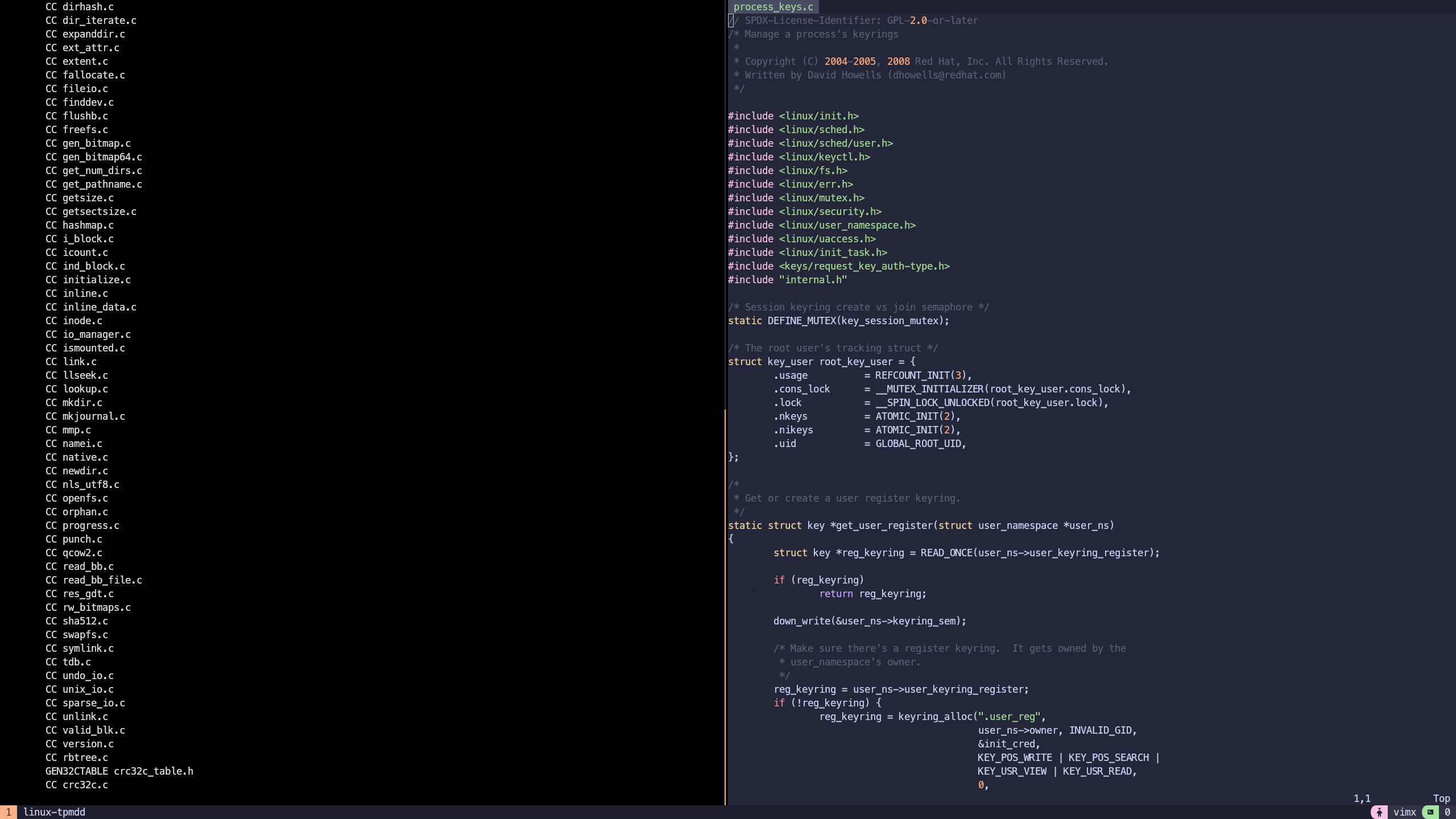Posts
4915Following
327Followers
491OpenPGP: 3AB05486C7752FE1
Jarkko Sakkinen
jarkkoNot sure if I dare to say this but what a load of nonsense.
Just to name an example, the standard for RISC-V with MMU is unfinished and ambiguous to the point that how a SiFive CPU's do stuff is more of a guideline than the specs. The commercial weight if AFAIK more in the compute core area where you just "fork" the hardware description and make it your own.
Not slandering RISC-V per se, I actually like many thing in that ISA, just saying that it is not *even* comparative to x86 and ARM at this point of time. E.g. OpenMIPS would have been (if there had been any analysis of other ISA's than x86).
https://hackaday.com/2024/03/21/why-x86-needs-to-die/
Jarkko Sakkinen
jarkkoInteractive external commands is also one reason that made me return back to regular #vim, in addition to working remotes out of the box and the fact that I use only a few plugins, which carry out somewhat trivial tasks where e.g. performance is not a factor.
Interactive external commands is a useful feature from time to time because it allows to leverage privileges for an external command.
For example, this will result an error in #neovim instead of a password prompt: :r !sudo ls.
Low Quality Facts
lowqualityfacts@mstdn.socialThe next time you're worried that you're not doing great at your job, just remember that someone probably made six figures to change HBO to HBO Max to Max.
bluca
bluca@fosstodon.orgJust published the #ASG2024 schedule! Lots of good stuff, and at least one terrible talk that nobody should attend.
Early bird tickets are also still available - but not for long - go grab them while they last!
Kees Cook (old account)
kees@fosstodon.orgAnother step forward towards making the compiler omniscient:
https://discourse.llvm.org/t/rfc-overflow-idiom-exclusion/80093
(Excluding "test for overflow" code patterns when using the unexpected overflow checker in Clang.)
Jarkko Sakkinen
jarkkoBuilt a site with a PDF resume (see /about) using Jekyll and Typst:
Woodpecker CI puts everything together for every push building both site and the resume:
https://codeberg.org/jarkko/pages/src/branch/main/.woodpecker.yml
And resume made with Typst is a separate project, which can be updated independently while publication is taken care by the site project: https://codeberg.org/jarkko/resume
This is convenient…
Jarkko Sakkinen
jarkkoI just realized that #vim has these in the distribution:
❯ ls -1 /usr/share/vim/vim91/pack/dist/opt/
cfilter
comment
dvorak
editexisting
editorconfig
justify
matchit
shellmenu
swapmouse
termdebug
Thus, I can shrink my plugin list a bit:
diff --git a/.vimrc b/.vimrc
index a66c03b..383ea80 100644
--- a/.vimrc
+++ b/.vimrc
@@ -35,13 +35,14 @@ nnoremap <silent> <C-l> :nohl<C-R>=has('diff')?'<Bar>diffupdate':''<CR><CR><C-L>
nnoremap <silent> <leader>lcd :lcd %:p:h<CR>:pwd<CR>
nnoremap <silent> <leader>n :set number!<CR>
+packadd! comment
+packadd! editorconfig
+
if !empty(globpath(&rtp, 'autoload/plug.vim'))
call plug#begin()
Plug 'ap/vim-buftabline', { 'as': 'buftabline' }
Plug 'catppuccin/vim', { 'as': 'catppuccin' }
- Plug 'editorconfig/editorconfig-vim', { 'as': 'editorconfig' }
Plug 'kaarmu/typst.vim', { 'as': 'typst' }
- Plug 'tpope/vim-commentary', { 'as': 'commentary' }
Plug 'vim-scripts/git_patch_tags.vim', { 'as': 'git_patch_tags' }
call plug#end()
endif
Leaving only:
if !empty(globpath(&rtp, 'autoload/plug.vim'))
call plug#begin()
Plug 'ap/vim-buftabline', { 'as': 'buftabline' }
Plug 'catppuccin/vim', { 'as': 'catppuccin' }
Plug 'kaarmu/typst.vim', { 'as': 'typst' }
Plug 'vim-scripts/git_patch_tags.vim', { 'as': 'git_patch_tags' }
call plug#end()
endif
#holiday activities
Jarkko Sakkinen
jarkkoJarkko Sakkinen
jarkkoI use ctags myself but if I’d really wanted to use LSP with kernel tree I’d put this running to a tmux pane:
echo vmlinux | entr scripts/clang-tools/gen_compile_commands.py
In English: every time vmlinux changes, compile_commands.json will change.
For more information, see https://eradman.com/entrproject/.
European Commission
EUCommission@ec.social-network.europa.euApple has committed to allowing rivals to access the 'tap and go’ technology of iPhones.
Today’s decision opens up competition.
From now on, competitors will be able to effectively compete with Apple Pay for mobile payments using iPhone in shops.
Read more: https://europa.eu/!tmg37y
Jarkko Sakkinen
jarkkoThen in the 2nd phase the SVG files would be embedded into company or organization template, as if each slide contained a full size image.
I guess this could potentially work out well, as long as aspect ratio matches.
I've been also thinking of creating a private deck.git, which would just contain random conclusion composed into "raw" slides. I'm lazy at preparing presentations so this could be a key to improve my game a bit in this area :-) I.e. capture an idea into a slide and commit at the time of realizing something...
Jarkko Sakkinen
jarkkoThe story goes like that some people use #Vim and #Emacs, and others use #IDE 's, and one should use the tools that help to get the job done.
OK, cool, who cares? I don't. Write your kernel patches with Microsoft Word if that works for you, as far as I'm concerned...
https://stackoverflow.blog/2020/11/09/modern-ide-vs-vim-emacs/
Jarkko Sakkinen
jarkkoI wonder if #NetworkManager will integrate as client of networkd? People like to hate NM but I actually like nmcli.
For instance, if I need to throw a bridge, I simply just:
nmcli connection add type bridge ifname br0 stp no
nmcli connection add type bridge-slave ifname enp63s0 master br0
nmcli connection up bridge-br0
NM is just an interface for whatever shenanigans below so I guess it should be possible to interface it to networkd, right?
Is #GNOME going to move forward with this eventually, or is NM going to be ditched? I don’t actually care how soon such thing might happen, I’m just worried about loosing good old NM ;-)




